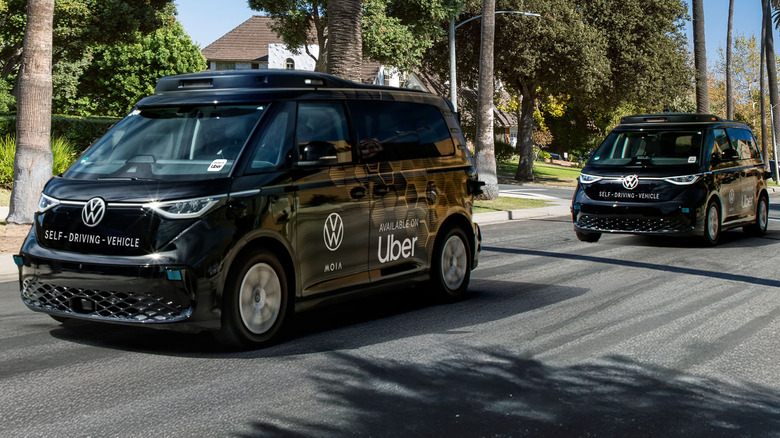1000’s of Volkswagen’s lovable ID Buzz electrical van, paired with Volkswagen autonomous mobility spinoff MOIA’s tech, will lay the muse for Uber‘s new autonomous driving taxi service when it launches commercially in Los Angeles late 2026. In line with a press release launched by the German automaker to Reuters, testing for this system will start later this 12 months. As with all early autonomous tasks, the brand new Uber buses can have an individual onboard for the testing and launch part to “assist refine the expertise and guarantee security.” The partnership between the German auto big and the journey share app, introduced on Thursday, is ready to run for the subsequent decade branded as ID Buzz AD. Neither celebration has disclosed the monetary phrases of the settlement.
For its half Volkswagen fell behind Toyota because the world’s largest automaker in 2024. Presumably the hope with this undertaking is to get extra butts in VW seats to expertise the Buzz first hand and generate top-of-mind consciousness to extend North American gross sales, whereas additionally shifting a couple of thousand of its dear vans into the Uber fleet. Uber has struggled for profitability prior to now, however 2023 and 2024 have been fairly profitable for the rideshare app innovator, experiences Monetary Occasions. One presumes the corporate is hoping to additional its profitability by counting on dear and unproven computer systems to drive passengers round as a substitute of getting to pay pesky human drivers a wage. The large tech playbook is in full swing, separating laborers from income. Who pays for rideshares when huge tech shifts all the roles to robots and no one can afford something anymore?
The state of autonomous rideshare
“Volkswagen isn’t just a automobile producer—we’re shaping the way forward for mobility, and our collaboration with Uber accelerates that imaginative and prescient,” Christian Senger, CEO of Volkswagen Autonomous Mobility, mentioned in a press release.
Kjell Gruner, president and CEO of Volkswagen Group of America provided that the partnership will “unleash the potential of autonomous mobility” and push the ID Buzz to “a rising variety of riders within the years to come back.”
MOIA’s major autonomous competitor, Waymo, already has 700 driverless rideshare robots in service throughout the U.S. and regardless of the corporate claiming over 100,000 rides per week has but to seek out something approaching profitability, says Futurism. Amazon-backed Zoox is poised to launch commercially in Las Vegas later this 12 months, in line with CNBC. Due to the flooded market, billions burned, and lack of confirmed monitor to profitability, Common Motors pulled the plug on its Cruise autonomy unit late final 12 months. Tesla mentioned on this week’s earnings name that it will likely be pushing robotaxi rides in Austin, Texas with a 10-20 automobile fleet “quickly” however we all know Tesla’s over-promise-and-under-deliver track and dance all too effectively at this level to imagine any of it.


